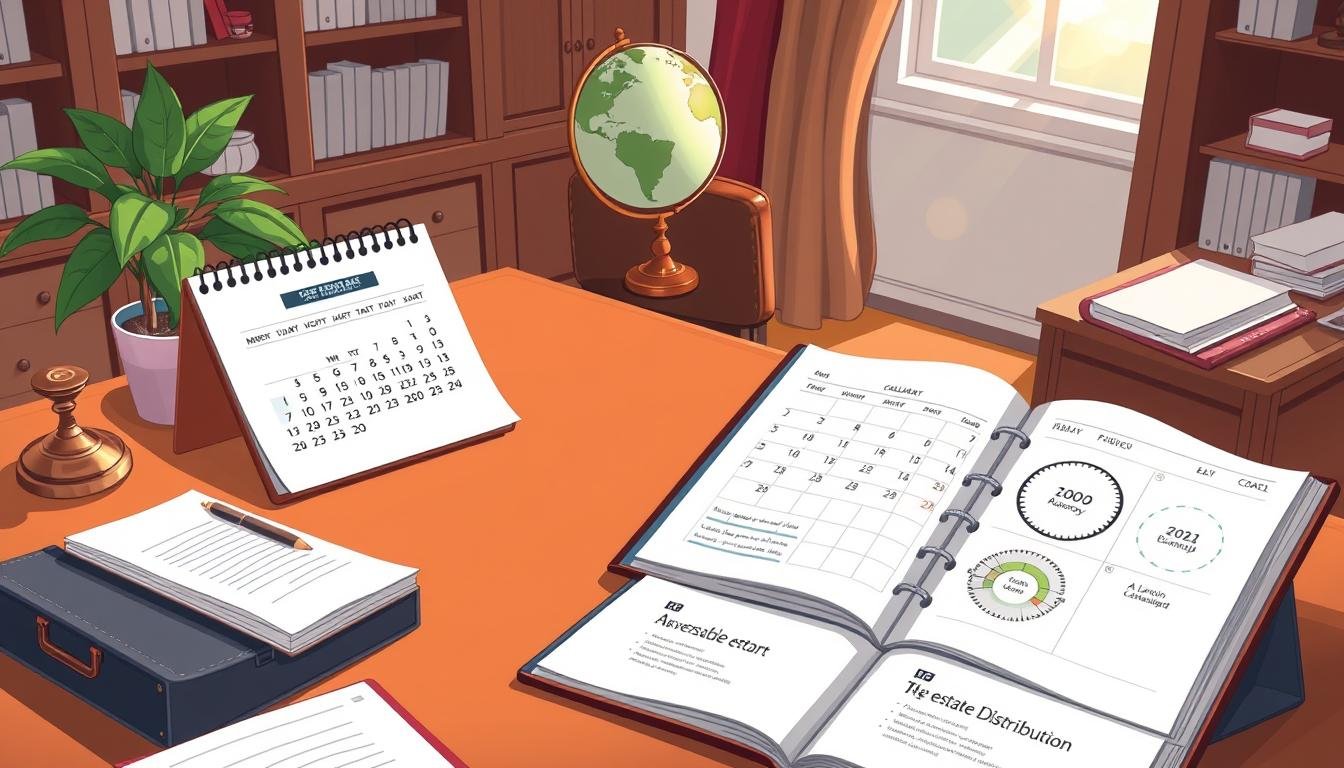Estate Planning Essentials
Estate planning is important for everyone, not just the rich. It helps you plan your legacy and protect your assets. If you own a home, have savings, or family heirlooms, planning ensures your wishes are followed.
A good estate plan does more than just share your stuff. It gives you peace of mind, knowing your loved ones are taken care of. It includes wills, trusts, and healthcare directives, all key parts of your plan.
Did you know dying without a will can lead to state laws deciding your assets? This might not match your wishes. Start with a 4-step checklist: list your assets, gather financial statements, review insurance, and meet with an estate planning attorney.
Estate planning isn’t a one-time thing. As your life changes, so should your plan. Regular updates keep your planning in sync with your life and the law.
Key Takeaways
- Estate planning is essential for everyone, regardless of wealth
- A comprehensive plan includes wills, trusts, and healthcare directives
- Regular reviews keep your estate plan aligned with life changes
- Proper planning can reduce tax liabilities and protect assets
- Naming guardians for minors is crucial in estate planning
- Trusts offer flexibility in asset management and distribution
Understanding the Fundamentals of Estate Planning
Estate planning is more than just writing a will. It’s about managing your assets and deciding how they’ll be shared. Let’s explore the main parts of estate planning and why it’s important for everyone.
What Constitutes Your Estate
Your estate includes everything you own, like houses, cars, stocks, and personal items. Making an asset inventory is key in estate planning. It helps you see all your assets and makes sure nothing is missed.
Why Everyone Needs an Estate Plan
Estate planning isn’t just for the rich. It’s important for everyone. Here’s why:
- Ensures your assets are given away as you wish
- Protects your family’s money future
- Helps avoid fights among family members
- Reduces taxes for your heirs
Key Components of Estate Planning
A good estate plan has several important parts:
| Component | Purpose |
|---|---|
| Wills | Specify who gets what and who takes care of kids |
| Trusts | Manage your assets, skip probate, and save on taxes |
| Power of Attorney | Choose someone to handle your money matters |
| Healthcare Directives | Share your medical wishes |
By adding these parts to your estate plan, you make sure your wishes are followed and your family is safe. Remember, estate planning is a continuous task that needs regular checks and updates.
Creating a Comprehensive Will and Trust Strategy
A solid estate plan relies on wills and trusts. These tools help make sure your wishes are followed and your assets go where you want. Let’s look at the important parts of a strong will and trust strategy.
Differences Between Wills and Trusts
Wills and trusts have different roles in estate planning. A will tells who gets your assets after you pass away. It goes through probate, a court process. Trusts, however, can skip probate and give you more control over your assets.
Benefits of Having Both Documents
Using both wills and trusts in your plan has many benefits. Wills make sure your wishes are known. Trusts can reduce estate taxes and avoid legal fights. Together, they protect your assets and family well.
| Document | Key Benefits |
|---|---|
| Will | Names guardians for minor children, specifies asset distribution |
| Trust | Avoids probate, offers privacy, can manage assets during incapacity |
Avoiding Common Mistakes in Will Creation
When making a will, avoid naming the same person in different ways. Also, don’t forget to update it often. Make sure your will matches the people you’ve named on accounts that don’t go through probate. Keeping your plan up to date is key.
Creating a good will and trust strategy is the base of a solid estate plan. It protects your assets and makes sure your legacy is carried out as you wish.
Power of Attorney: Financial and Medical Decisions
Estate planning is more than just wills and trusts. It also includes powers of attorney for financial and medical decisions. These documents make sure your wishes are respected if you can’t make them yourself.
A durable power of attorney lets someone handle your finances if you can’t. They can pay bills, sell assets, or file taxes for you. It helps avoid court involvement in your financial life.
For health decisions, you need a healthcare power of attorney. This document names someone to make medical choices for you when you can’t. They’ll work with doctors to ensure you get care that fits your values and preferences.
“Choosing the right people for your powers of attorney is critical. Pick trustworthy individuals who understand your views and can make tough decisions.”
Laws about powers of attorney vary by state. It’s wise to work with a lawyer to create documents that follow your state’s rules. They can also help you add specific instructions or limits you want.
| Type of Power of Attorney | Purpose | Key Considerations |
|---|---|---|
| Durable Power of Attorney | Financial decisions | Remains active during incapacity |
| Healthcare Power of Attorney | Medical decisions | Separate from financial power of attorney |
Don’t forget to name backup agents for both types of power of attorney. This ensures someone is always ready to step in if your first choice isn’t available. With these documents in place, you’ll have peace of mind knowing your affairs are in good hands.
Asset Protection and Beneficiary Designations
Protecting your assets and picking the right beneficiaries are key in estate planning. This helps make sure your wealth goes where you want it to. It also keeps your loved ones financially secure.
Choosing Primary and Contingent Beneficiaries
Choosing who gets your assets is very important. This includes things like retirement accounts and insurance policies. It’s smart to pick both a primary and a backup beneficiary. This way, your assets will go to the right people, even if your first choice can’t take them.
- Select beneficiaries over 21 and mentally competent
- Consider naming a trust or charity as a beneficiary
- Review designations after major life events
Asset Inventory Management
Keeping an accurate list of your assets is crucial. This list should include everything from your house to your bank accounts and insurance policies. Keeping it up to date helps make sure your estate plan is current.
Retirement Accounts and Insurance Policies
Retirement accounts and insurance policies often go directly to your beneficiaries, not through your will. Life insurance gives money to your loved ones quickly. Retirement accounts have their own rules, so it’s important to know them.
| Account Type | Key Considerations |
|---|---|
| IRAs | Non-spouse beneficiaries face a 10-year payout period |
| 401(k)s | Spouse waivers may be required for non-spouse primary beneficiaries |
| HSAs | Spousal inheritance allows continued tax benefits |
Remember, if your beneficiary choices are out of date, it could cause problems. It’s important to check and update them regularly. This makes sure your estate plan matches your current wishes and situation.
Estate Planning Essentials for Family Protection
Estate planning is key to protecting your family’s future. It’s not just about who gets what. It’s about making sure your loved ones are taken care of when you’re not there.
Guardianship Arrangements for Minor Children
Choosing guardians for your minor children is a top priority in estate planning. This choice ensures your kids are raised by someone who shares your values. They will also be financially supported. In Texas, you can pick a guardian for your child’s care and finances.
Family Wealth Preservation Strategies
Keeping your family’s wealth safe is vital for your children’s future. It’s not just about saving money. It’s about planning smartly and protecting your assets. Here are some strategies:
- Create trusts to manage and distribute assets
- Set up life insurance policies
- Establish education funding plans
- Use transfer-on-death (TOD) designations for accounts
Here’s a look at how assets are distributed in estate planning:
| Distribution Method | Percentage |
|---|---|
| Ownership or title | 30% |
| Beneficiary designation | 30% |
| Will | 20% |
| State laws (no will) | 20% |
Estate planning is not a one-time thing. It needs regular checks and updates. This ensures your family’s protection stays strong, even as things change.
Healthcare Directives and Medical Planning
Planning for future medical care is key in estate planning. Advance directives help share your healthcare wishes. They guide medical decisions when you can’t speak for yourself.
A living will is a type of advance directive. It outlines your end-of-life care preferences. This includes treatments like CPR and pain management, as well as organ donation choices.
HIPAA authorization is also crucial. It lets chosen individuals access your medical info. This ensures your healthcare wishes are respected and prevents family conflicts.
“More than 70% of Americans die without any advance directives or end-of-life plans.”
Creating these documents isn’t just for older adults. Unexpected situations can happen at any age. It’s wise to prepare early and update your directives regularly. This keeps them in line with your current values and health status.
| Document | Purpose | Key Points |
|---|---|---|
| Living Will | Outlines end-of-life care preferences | Covers life-sustaining treatments, pain management, organ donation |
| HIPAA Authorization | Allows access to medical information | Designates individuals who can receive your health data |
| DNR/DNI Orders | Specifies resuscitation preferences | Must be reiterated at each medical facility admission |
Remember, advance directives are living documents. You can change them as your circumstances or preferences evolve. Always share updated versions with your healthcare providers, family, and designated agents.
Tax Considerations in Estate Planning
Estate planning is all about taxes. Knowing about estate tax, gift tax, and smart tax strategies is key. It helps protect your wealth and ensures your loved ones get what you’ve worked for.
Understanding Estate Tax Implications
In 2024, the estate tax exemption is $13.61 million per person. Estates under this amount won’t pay federal estate taxes. But, this number is set to drop to $6-7 million by 2025 unless Congress acts.
Gift Tax Planning
Gift tax planning can lower your estate tax. The annual gift exclusion lets you give a certain amount to each person without taxes. For couples, this is a great way to pass on wealth.
Tax-Efficient Transfer Strategies
There are many ways to keep your wealth safe:
- Charitable Remainder Trusts (CRTs) can cut down estate tax a lot
- Irrevocable Life Insurance Trusts (ILITs) can keep life insurance out of your estate
- Putting more into retirement accounts like 401(k)s and IRAs can lower your taxes
Getting help from estate planning experts is smart. They know the tax laws well. They can make your plan work best for you, saving taxes and meeting your wishes.
Regular Estate Plan Review and Updates
Life is always changing, and so should your estate plan. It’s important to review your estate plan regularly. This ensures your wishes are up to date. Events like marriages, divorces, births, or deaths might mean you need to make changes.
Experts say you should check your estate plan every 3-5 years or after big life changes. This keeps your plan in line with the law and your goals. Make sure to look at who your beneficiaries are, your powers of attorney, and your healthcare directives.
- Review and update beneficiary designations
- Check power of attorney arrangements
- Update healthcare directives
- Assess changes in assets or debts
- Review tax implications
Life events often mean you need to update your documents. For instance, getting married or divorced means you need to change your will and who gets your stuff. Having a child might make you want to set up a trust or choose guardians.
| Life Event | Potential Estate Plan Updates |
|---|---|
| Marriage | Update will, beneficiary designations |
| Divorce | Revise will, change beneficiaries |
| Birth of a child | Establish trust, name guardians |
| Death of beneficiary | Adjust will, update beneficiaries |
Don’t forget, an old estate plan can cause problems. By keeping up with regular reviews and updates, you protect your interests and those of your loved ones.
Conclusion
Estate planning is crucial for a secure financial future. It’s not just about writing a will. It’s about protecting your legacy and your loved ones.
Each part, like wills, trusts, powers of attorney, and healthcare directives, is important. They all work together to secure your future.
Estate planning is not a one-time thing. Your life changes, and so should your plan. Regular updates keep your wishes valid and legal.
Even famous people like Aretha Franklin can forget to plan their estates. Don’t let your legacy get complicated.
Getting help from experts is important, no matter the size of your estate. Estate planning attorneys and financial advisors can guide you. They help with taxes and create a plan that fits you.
With tax rates up to 40% for big estates, planning is key. Take charge of your future today. Your loved ones will be grateful tomorrow.
Source Links
- Estate Planning Checklist
- Estate Planning Essentials: 7 Key Steps | Morgan Stanley
- The Basics of Estate Planning
- Essential Guide to estate planing for Everyone
- Estate Planning Basics: Secure Your Future and Protect Your Loved Ones • BlueNotary
- Estate Planning Basics, Tips, and Essential Documents
- Estate Planning 101: What Is Estate Planning?
- A Guide to Essential Estate Planning Documents: Wills, Trusts, Power of Attorney and More
- The complete guide to estate planning
- 6 Estate Planning Must-Haves
- A Durable Power of Attorney is Essential
- Mastering the Essential Estate Planning Documents You Need
- A Guide to Asset Protection and Wealth Management
- Essential Guide to Beneficiary Designations for Estate Planning
- T. Rowe Price Personal Investor – The Estate Planning Essentials That Will Help Ensure Your Family’s Security
- 7 Estate Planning Essentials – The Building Blocks You Need | RBFCU
- 3 Estate Planning Essentials To Protect Your Family
- Your guide to living wills and other advance directives
- Estate Plan Essentials: Advance Directives & End-Of-Life Planning
- Essential Tax and Estate Planning Strategies in 2023
- Estate Planning: Estate Tax Basics
- Estate Planning Information from Respected ACTEC Lawyers & Professors
- Build a Strong Foundation: Estate Planning Essentials
- Estate Planning 101: What Is Estate Planning?
- The essential estate planning documents you need to protect your assets and loved ones
- Estate Planning Checklist: A 7-Step Guide – NerdWallet
- Estate Planning: 16 Things to Do Before You Die








